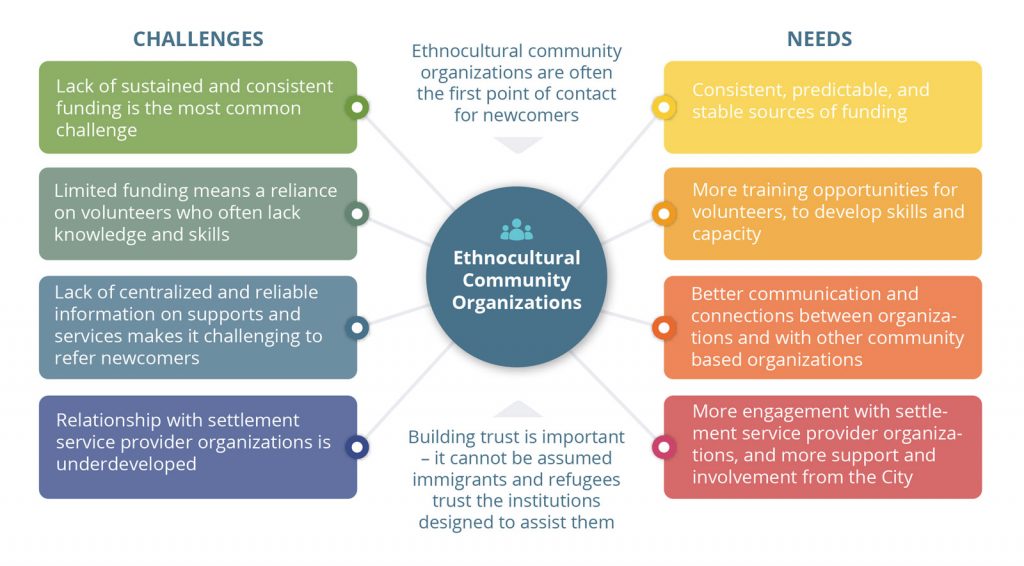‘Ethnocultural Communities’ Role in Supporting
Newcomers to Winnipeg
Researchers: Jill Bucklaschuk1, Reuben Garang2, Janelle Gobin3, and Ray Silvius3
Affiliation: University of Guelph1, Immigration Partnership Winnipeg2, and University of Winnipeg3
Research Partner: Immigration Partnership Winnipeg (IPW)
Keywords: Ethnocultural community organizations, integration, settlement, newcomer support, employment, funding, housing, language services, families
Jump to: Full Infographic, Methodology, Findings, Publications & Reports
Summary
Objective: To better understand, acknowledge, and support the work done by ethnocultural community groups in meeting the needs of immigrants and refugees in Winnipeg.
Justification: Ethnocultural community organizations are often a first point of contact for many newcomers, yet little is known about their role in the settlement process. It is necessary to better understand where newcomers go to access information and supports and to give policymakers, researchers, and service providers a clear picture of the formal and informal sources they access.
Practical goal: To focus on the role of ethnocultural community organizations in newcomer settlement and highlight where more support is needed. The study will inform Immigration Partnership Winnipeg’s (IPW) future initiatives and provide representatives of ethnocultural community organizations with a resource to leverage funding and supports.
Primary audience: Ethnocultural community organizations, service providers, policy makers, and municipal governments.
Infographic Excerpt

Methodology
Two community workshops were facilitated by IPW, bringing together representatives of Winnipeg’s ethnocultural communities to discuss concerns, challenges, and opportunities regarding newcomer settlement. In the first workshop, funding was the most common challenge discussed. In response, the second workshop focused on identifying funding sources and developing successful proposals. The research report brings together the discussions from those two workshops into a cohesive narrative of the experiences, challenges, and concerns faced by ethnocultural community organizations.
Findings
Ethnocultural organizations play an important trust-building role in newcomer settlement, as newcomers do not always trust the formal institutions designed to assist them.
- Lack of sustained and consistent funding is the most common challenge faced by ethnocultural community organizations; this has implications for all aspects of their operations, including the ability to obtain physical spaces and employ qualified staff. Secure funding is needed to assure their ability to provide a continuum of services and supports.
Many ethnocultural community organizations rely on volunteers. Recruiting and retaining dedicated volunteers is a challenge, and burnout is common due to long, irregular hours and strains on personal finances. A fluctuating group of volunteers often lacks the knowledge and skills necessary to effectively provide services to newcomers. Ethnocultural community organizations need access to training opportunities that build the essential skills and capacity of volunteers.
- Representatives from ethnocultural community organizations lack access to reliable information about supports and services available for newcomers. As a result, there is concern that the referrals they make to newcomers are out-of-date or incomplete. Better communication and connections between organizations would be beneficial.
- Ethnocultural community organizations report an underdeveloped relationship with settlement service provider organizations. Increased collaboration between the two sectors would be beneficial to ensure a continuum of services for newcomers.
Ethnocultural community organizations would like greater recognition, support, and engagement from the municipal government.
Explore more projects


